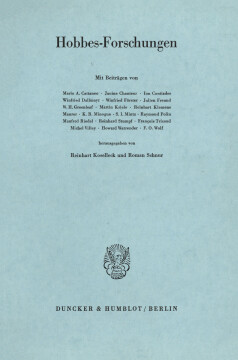Hobbes-Forschungen

BOOK
Cite BOOK
Style
Format
Hobbes-Forschungen
Editors: Koselleck, Reinhart | Schnur, Roman
(1969)
Additional Information
Book Details
Pricing
Table of Contents
| Section Title | Page | Action | Price |
|---|---|---|---|
| Vorwort | 5 | ||
| Inhalt | 7 | ||
| W. H. Greenleaf, Swansea: Hobbes: The Problem of Interpretation | 9 | ||
| I. | 9 | ||
| II. | 22 | ||
| III. | 29 | ||
| Julien Freund, Strasbourg: Le Dieu Mortel | 33 | ||
| Samuel I. Mintz, New York: Hobbes on the Law of Heresy: A New Manuscript | 53 | ||
| I. | 53 | ||
| II. | 53 | ||
| III. | 56 | ||
| François Tricaud, Lyon: «Homo homini Deus», «Homo homini Lupus»: Recherche des Sources des deux Formules de Hobbes | 61 | ||
| Winfried Förster, Garbsen: Thomas Hobbes und der Puritanismus. Grundlagen und Grundfragen seiner Staatslehre | 71 | ||
| I. | 71 | ||
| II. Die Bedeutung des Puritanismus in der ersten Hälfte des 17. Jahrhunderts | 73 | ||
| 1. Die innere Konfliktsituation des Puritaners | 73 | ||
| 2. Die puritanische Lehre vom Covenant: Henry Jacob | 74 | ||
| III. Thomas Hobbes und der Puritanismus vor 1640 | 77 | ||
| 1. Hobbes und der Puritanismus in Oxford | 77 | ||
| 2. Hobbes und das Problem der Religionskriege | 77 | ||
| IV. Hobbes’ Reaktion auf den Puritanismus in seinen staatspolitischen Schriften | 79 | ||
| 1. Die Problematik der Lehre vom Covenant | 79 | ||
| 2. Die Ursachen für den Bürgerkrieg | 84 | ||
| V. Henry Jacob und Thomas Hobbes – ein Vergleich | 85 | ||
| VI. | 88 | ||
| Ion Contiades, Athen: Zur Verortung des Leviathan. Thomas Hobbes und das Osmanenreich | 91 | ||
| Manfred Riedel, Heidelberg: Zum Verhältnis von Ontologie und politischer Theorie bei Hobbes | 103 | ||
| I. | 104 | ||
| II. | 108 | ||
| III. | 111 | ||
| F. O. Wolf, Saarbrücken: Zum Ursprung der politischen Philosophie des Hobbes. Hobbes’ Konzeption der „politisch-klugen Geschichtsschreibung“ in den „Essayes, addressed to his Father, by William Cavendish“, von 1615–1620 | 119 | ||
| I. | 123 | ||
| II. | 125 | ||
| Raymond Polin, Paris: L’Obligation Morale et Politique chez Thomas Hobbes | 133 | ||
| I. L’Idée d’obligation | 133 | ||
| II. L’obligation morale, naturelle | 137 | ||
| III. L’obligation politique | 141 | ||
| IV. Obligation et Théologie | 148 | ||
| Howard Warrender, Belfast: A Postscript on Hobbes and Kant | 153 | ||
| K. R. Minogue, London: Hobbes and the Just Man | 159 | ||
| I. | 159 | ||
| II. | 162 | ||
| III. | 170 | ||
| Michel Villey, Paris: Le Droit de l’Individu chez Hobbes | 173 | ||
| I. Notion du Droit de l’Individu | 175 | ||
| II. Le Système juridique de Hobbes comme système des droits subjectifs | 185 | ||
| 1. Les droits subjectifs naturels au principe du système de Hobbes | 185 | ||
| 2. Les droits civils, au terme du système de Hobbes | 189 | ||
| Mario A. Cattaneo, Milano: Hobbes Théoricien de l’Absolutisme Eclairé | 199 | ||
| Martin Kriele, Köln: Notes on the Controversy between Hobbes and English Jurists | 211 | ||
| Introduction | 211 | ||
| Janine Chanteur, Paris: Note sur les Notions de «Peuple» et de «Multitude» chez Hobbes | 223 | ||
| François Tricaud, Lyon: Quelques Questions Soulevées par la Comparaison du «Léviathan» Latin avec le «Léviathan» Anglais | 237 | ||
| Reinhart Klemens Maurer, Stuttgart: Stellungnahme zu einigen Referaten des Hobbes-Kolloquiums | 245 | ||
| I. | 245 | ||
| II. Zu M. Kriele: Thesen zur Kontroverse zwischen Hobbes und den englischen Juristen | 245 | ||
| III. Zu H. Warrender: Hobbes’ Conception of Morality | 250 | ||
| IV. Zu: R. Polin: L’Idée d’Obligation und K. R. Minogue: Hobbes and the Just Man | 253 | ||
| V. | 256 | ||
| Winfried Dallmayr, Lafayette: Hobbes and Existentialism: Some Affinities | 259 | ||
| I. Mind and Matter, Being and Consciousness | 261 | ||
| II. Anthropology and Social Conflict | 266 | ||
| III. Natural Law and Ethics | 271 | ||
| IV. Social Contract and Commonwealth | 279 | ||
| Reinhard Stumpf/Ion Contiades/Bernard Willms: Hobbes im deutschen Sprachraum – Eine Bibliographie | 287 | ||
| I. Übersetzungen | 287 | ||
| II. Literatur | 288 |
